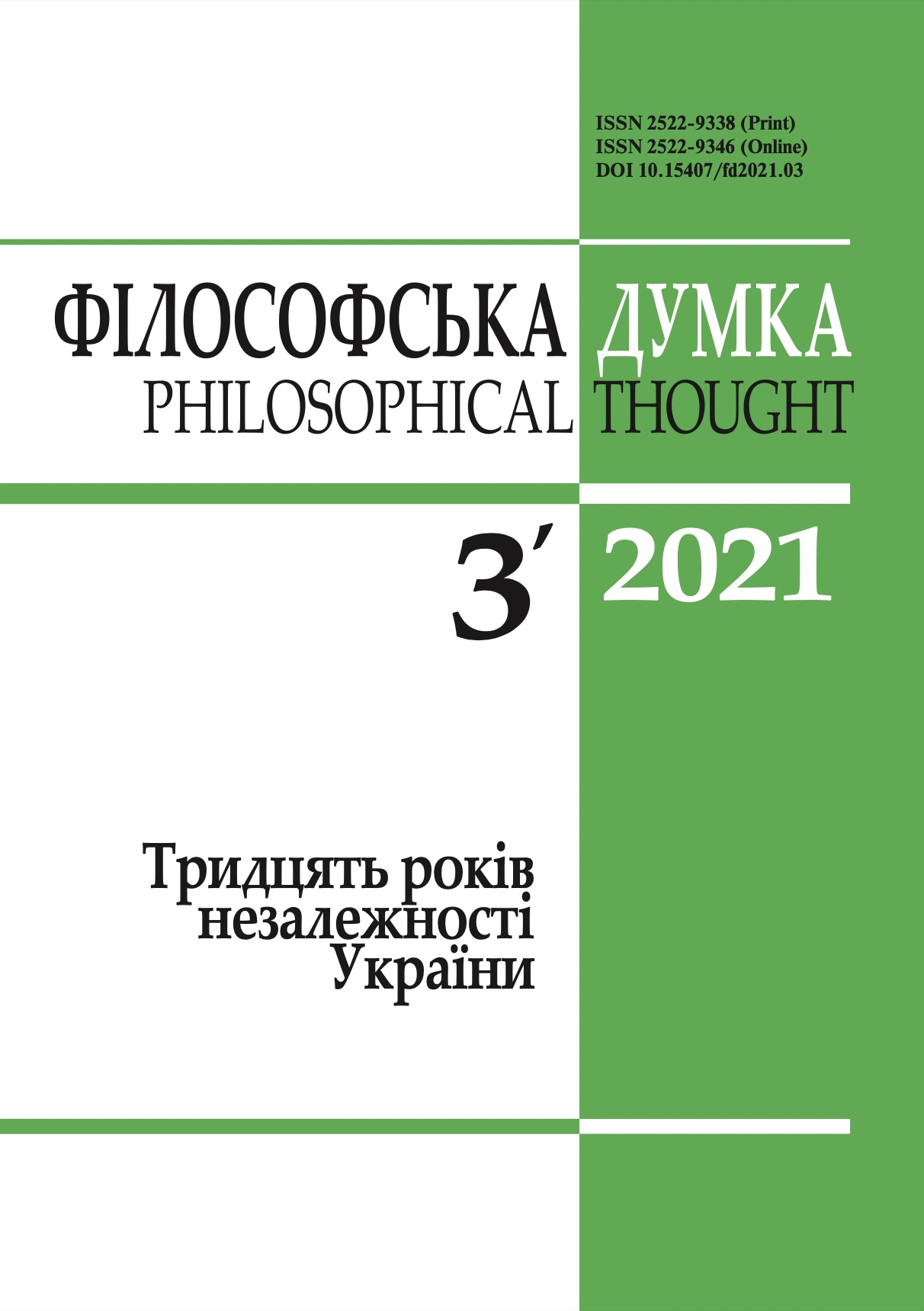“UKRAINE’S GLORY HAS NOT YET DIED, NOR HER FREEDOM HAS” (TO THE QUESTION OF THE UKRAINIAN STATEHOOD “RENAISSANCE”)
DOI:
https://doi.org/10.15407/fd2021.03.079Keywords:
, desubjectivation of Ukraine, interruption of national existence, death of Ukraine, statehood, cossacksAbstract
The problem of the "revival" (renaissance) of the Ukrainian statehood has been the focus of attention for centuries. On the other hand, Ukrainian intellectual discourse has not been able formulate an integral and consolidated image of the past. A significant obstacle on this path was the state policy of memory of an ad hoc nature, which was built through a combination of Soviet and Ukrainian approaches to the interpretation of the past. The lack of a unifying historical narrative, the regionalization of history interpretations of Ukraine have fueled interpersonal and interregional hostility within Ukrainian society for decades. It has become a fertile ground for the humanitarian aggression of neighboring countries, aimed at desubjectivation of Ukraine through destruction of historical foundations of statehood in public consciousness of the Ukrainians themselves. The points of their spokesmen are reinforced by arguments of the conservative pro-Ukrainian historians, who, trying to consider the history of Ukrainian statehood in the context of general civilization development, have devel- oped the thesis of “non-historical” Ukrainian nation due to interruption of national existence in the sixteenth and eighteenth centuries. This approach, as shown in the article, was important for raising attention of global com- munity to the Ukrainian issue in the second half of the twentieth century, even though it did not reflect the real case. After all, even at the time of strengthening of assimilation policy on the part of neighboring states, Ukrainians did not have the interruption of national existence and contin- ued to cultivate diverse ideas of "revival" and development of their own statehood. Such desire was especially evident in the seventeenth century due to active position of the Cossacks, who managed to wield influence on all segments of Ukrainian population, raising it to an armed struggle for their own freedom and statehood. The inability of the Cossacks to fully implement the tasks gave rise to notes of pessimism in the minds of Ukrainians, whose faith in the revival of their own statehood faded away, but never waned at all. Cherishing the former Cossack greatness, Ukrainians, contrary to the assimilationist policy of the ruling nations or stratums, have always found the strength to speak out reminding themselves and the world that “Ukraine`s glory has not died, nor her freedom”, and therefore they will defend their own statehood.
References
Vyshensky, I. (1986). Writings. Translation, notes and preface by V. Shevchuk. [In Ukrainian]. Kyiv: Dnipro.
Grabovych, G. (1997). To the history of Ukrainian literature: Research, essays, polemics. [In Uk- rainian]. Kyiv: Osnovy.
Yakymenko, Yu. et al. (2016). The identity of citizens of Ukraine: changes, tendencies, regional features. [In Ukrainian]. National security and defense, 3—4 (161—162), 3—57.
History of Rus. (2001). Transl. I. Drach. [In Ukrainian]. Kyiv: Veselka. [= Історія Русів 2001] Kostomarov, M. (2015). The book of existence of the Ukrainian people. [In Ukrainian]. S.l.
Lysyak-Rudnytsky, I. (1994). Historical essays. In 2 vols. Transl. from English M. Bazik, U. Havryshkiv, J. Hrytsak et al. Vol. 1. [In Ukrainian]. Kyiv: Osnovy.
Shevchuk, V. (Ed.). (1989). Field of Mars. Book Two: Heroic Poetry in Ukraine: The Second Half of the 17th — the Beginning of the 19th Centuries. [In Ukrainian]. Kyiv: Molod.
Yablonsky, V. et al. (2019). The policy of historical memory in the context of national security of Ukraine: an analytic report. [In Ukrainian]. Kyiv: NISD.
Potulnytsky, V. (2000). Ukrainian conservatism as an ideological and socio-political prerequisite for the formation of the 2nd Ukrainian Hetmanate: main directions and concepts (1789— 1914). [In Ukrainian]. Bulletin of Kyiv State Linguistic University. Series “History, Economics, Philosophy”, 4, 68—118.
Semchyshyn, M. (1993). Thousand years of Ukrainian culture: a historical review of the cultural process. [In Ukrainian]. Kyiv: Second Hand, Phoenix.
Shevchuk, V. (Ed.). (2001). A thousand years of Ukrainian socio-political thought. In 9 vols. Vol. 2. Book. 1. XVI century. [In Ukrainian]. Kyiv: Dnipro.
Ukrainian humanists of the Renaissance: an anthology. (1995). In 2 parts. Part 1. [In Ukrainian]. Kyiv: Naukova Dumka.
Shevchuk, V. (2021). The Cossack state as an idea in the system of socio-political thinking of the XVI—XVIII centuries. In 2 books. Book 1. [In Ukrainian]. Kyiv: Clio Publishing House.
Downloads
-
PDF (Українська)
Downloads: 295
Published
How to Cite
Issue
Section
License
Authors who publish with this journal agree to the following terms:
- Authors retain copyright and grant the journal right of first publication.
- Authors are able to enter into separate, additional contractual arrangements for the non-exclusive distribution of the journal's published version of the work (e.g., post it to an institutional repository or publish it in a book), with an acknowledgement of its initial publication in this journal.
- Authors are permitted and encouraged to post their work online (e.g., in institutional repositories or on their website) prior to and during the submission process, as it can lead to productive exchanges, as well as earlier and greater citation of published work (See The Effect of Open Access).


